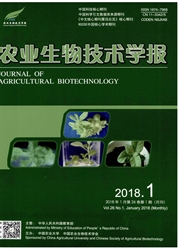

 中文摘要:
中文摘要:
为了探讨精子黏附蛋白基因Spermadhesins(AQN1、AQN3、AWN、PSPⅠ和PSPⅡ)和精子运动抑制因子(seminal plasma motility inhibitor,SPMI)在成熟精子中m RNA表达水平与精子获能和顶体反应之间的关系,本研究采用体外诱导法使猪(Sus scrofa)精子获能并发生顶体反应,再利用半定量RT-PCR(semiquantitative RT-PCR,sq RT-PCR)对精子中Spermadhesins和SPMI m RNA表达差异进行分析。体外诱导结果表明,精子获能率和顶体反应率分别为58.41%和35.34%。sq RT-PCR结果显示,大多数Spermadhesins m RNA表达水平随着获能的时间延长而提高。AQN1和PSPⅡ基因获能4 h后,表达略有增加;获能8 h后,表达水平显著提高(P〈0.05),但与获能4 h相比差异不显著(P〉0.05)。AQN3与PSPⅠ呈现相似规律,m RNA表达水平在获能4 h后变化不明显,但获能8 h后,与对照组和获能4 h精子组相比,有显著提高(P〈0.05)。AWN m RNA表达水平随着获能时间延长而略有下降,但差异不显著(P〉0.05)。获能4 h后SPMI m RNA表达略有下降,而8 h后又有所提高,无明显规律,且各组间无显著差异(P〉0.05)。经孕酮诱导精子顶体反应后,除AWN基因外,其他基因包括AQN1、AQN3、PSPⅠ、PSPⅡ和SPMI m RNA表达水平都有所提高,但只有PSPⅠ和PSPⅡm RNA表达显著升高(P〈0.05),而AWN m RNA表达水平则显著下降(P〈0.05)。Spermadhesins可能对精子获能起正向调控作用或者参与精卵互作,SPMI基因可能不参与精子获能和顶体反应生理过程。研究结果为进一步了解精子的运动、获能和顶体反应机制提供重要参考资料。
 英文摘要:
英文摘要:
To analyze the association between m RNA expression levels of Spermadhesins gene(AQN1,AQN3, AWN, PSPⅠ and PSPⅡ) and sperm motility inhibitor gene(SPMI) in ejaculated sperm with sperm capacitation and acrosome reaction status, swine(Sus scrofa) sperm capacitation and acrosome reaction status were induced in vitro. The expression levels of Spermadhesins and SPMI genes in sperms were analyzed bysemiquantitative RT- PCR(sq RT- PCR). The results showed that the percentage of sperm capacitation and acrosome reaction was 58.41% and 35.34%, respectively. Most Spermadhesins m RNA expression levels were increased with capacitation time prolonged. AQN1 and PSP Ⅱ m RNA levels were increased a little with capacitation for 4 h, while significantly increased with capacitation for 8 h(P〈0.05). The difference between4 and 8 h was not significant(P〉0.05). AQN3 and PSPⅠ m RNA level demonstrated the similar expression rythme, with no significant change at 4 h capacitation or significant higher at 8 h capacitation than 4 h and control. AWN m RNA level was decreased with capacitation time prolonged, but the difference was not significant(P〉0.05). SPMI m RNA level was decreased at 4 h capacitation and increased at 8 h capacitation,but no obvious rythme with no significant difference among groups(P〉0.05). AQN1, AQN3, PSPⅠ, PSPⅡ and SPMI m RNA level were all increased after acrosome reaction induced by progesterone( P4) except AWN,among which PSPⅠ and PSPⅡ were increased significantly(P〈0.05), and AWN was decreased significantly(P〈0.05). The results showed that Spermadhesins might play a positive control on sperm capacitation, or take part in the interaction of oocytes and sperms. SPMI gene might not work on sperm acrosome reaction and capacitation. This study will be helpful greatly to further research the mechanism of sperm action, capacitation and acrosome reaction.
 同期刊论文项目
同期刊论文项目
 同项目期刊论文
同项目期刊论文
 期刊信息
期刊信息
